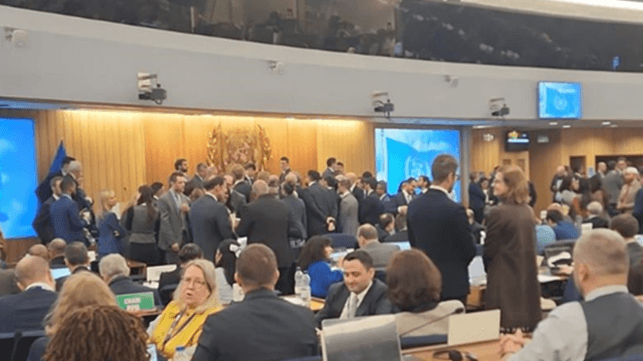IMO Council Elections Heat Up

This week will be a tense one at the International Maritime Organization (IMO)'s London headquarters overlooking the River Thames in London. During the IMO's 34th Assembly, delegates will vote on November 28 to elect 20 Category C members of the IMO's Council.
Category A and B members of the Council are selected on the basis of calculation, for having the largest interests in shipping services and in international seaborne trade. But Category C members are elected, with delegates invited to vote for countries which either have special maritime interests or whose election would balance geographic representation across the Council.
There are 26 countries standing for election, and 20 seats to fill. All the 20 existing Category C members who have served for the past two years are standing again, and there are six new countries vying to be elected: Belgium, Nigeria, Oman, Pakistan, South Africa and Thailand.
Delegates will no doubt be considering if the existing 20 Category C Council members have made useful contributions, against the potential contributions which new members might be able to make. All those standing will no doubt be seeking to do so because they have national interests to promote. But some more than others will have specific attributes which will be useful in managing global maritime affairs.
One new candidate in particular looks well-suited to be able to contribute to the global maritime community. Oman shares control with Iran of the Traffic Separation Scheme which operates in the Straits of Hormuz, one of the world's busiest shipping channels - but it is in a position to balance any moves Iran might make to close the Strait, either by offering access solely through its own waters on the southern side of the Strait, but also by dint of a close technical working relationship with Iran developed over time. Oman also maintains the navigational aids which aid shipping using the Traffic Separation Scheme.
Oman has a well-practiced capability for discreet mediation between parties in conflict, and is a neutral in international relations, enjoying good relations with everyone. This capability is used in general diplomatic disputes - usually without credit being claimed - but also particularly when it comes to dealings with the Houthis and Iran.

that matters most
Get the latest maritime news delivered to your inbox daily.
The Houthis look like being an enduring threat to Red Sea and Gulf of Aden shipping, so Oman's membership of the Council would be particularly useful over the next term. Oman helped secured the release of the MV Galaxy Leader crew in January, has intervened to achieve the release of UN humanitarian staff, and also has achieved other discreet mediation successes over the years, many of which have been brokered through Oman's busy permanent representative based in the IMO, Capt. Mansoor Al Wahaibi.
Nigeria and South Africa are competing for a seat alongside existing Council member Kenya, on a ticket to improve African geographical representation. Thailand is also a strong contender, based on its broad trading links and diplomatic outreach, and is represented in the IMO by its ambassador to London, H.E. Mr. Nadhavathna Krishnamra.
